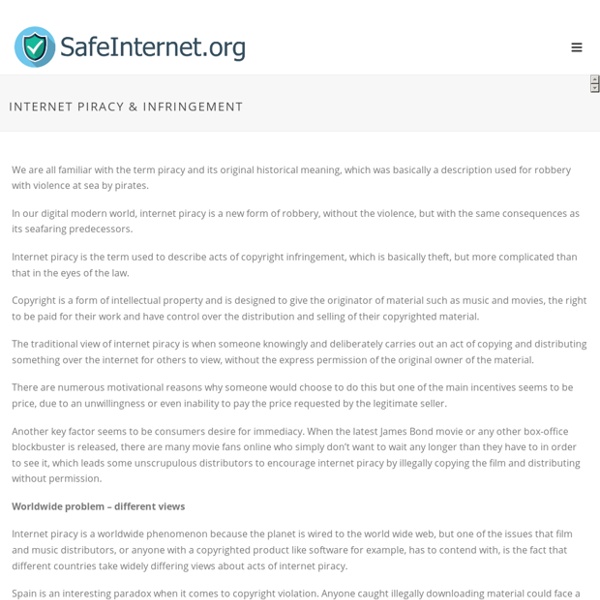Internet Piracy
Megan Ptak, Wylder Tallman, Derek Holbrook, Maria DiPilato, Jaime McGrath 11 December 2017 Intro to Communication & Media Dr. Sylvia Internet Piracy
Identity Theft and Fraud
Having your identity stolen can be scary and invasive and have damaging effects on your finances, medical records and reputation. If you become a victim, knowing how to respond and report the incident is vital. Here are some tips and resources to help you recover.
Cyberbullying - National Bullying Prevention Center
Just as the use of technology itself has evolved, so has the ability to bully. Bullying, once restricted to the school or neighborhood, has now moved into the online world. Bullying through the use of technology is referred to as “cyberbullying.” Cyberbullying is the use of technology to repeatedly and intentionally harass, hurt, embarrass, humiliate, or intimidate another person. As adults, thinking back, it was just a generation ago that kids and teens were asking their parents for a phone in their room — maybe even one with a separate line or three-way calling — so they could easily and somewhat privately connect with more friends.
Online Identity Theft: What It Is and How It Happens - LifeLock
Gone are the days when my biggest concern related to financial crime was having my wallet stolen on the packed Metro in Washington, D.C. Now? We also face technology-based crimes, including online identity theft. In our cyber-focused 21st century, cool digital products and the Internet open a world of easy access to information, entertainment, and other services. But this cyber gateway also presents the possibility of our personal information falling into the wrong hands—and to becoming victims of online identity theft.
Fair Use
The policy behind copyright law is not simply to protect the rights of those who produce content, but to "promote the progress of science and useful arts." U.S. Const. Art. I, § 8, cl. 8. Because allowing authors to enforce their copyrights in all cases would actually hamper this end, first the courts and then Congress have adopted the fair use doctrine in order to permit uses of copyrighted materials considered beneficial to society, many of which are also entitled to First Amendment protection.
What Is Cyberbullying
Cyberbullying is bullying that takes place over digital devices like cell phones, computers, and tablets. Cyberbullying can occur through SMS, Text, and apps, or online in social media, forums, or gaming where people can view, participate in, or share content. Cyberbullying includes sending, posting, or sharing negative, harmful, false, or mean content about someone else. It can include sharing personal or private information about someone else causing embarrassment or humiliation.
Online Disinhibition Effect
The Internet has brought about numerous changes in social relationships, and the online disinhibition effect has been heavily discussed and documented. This effect characterizes the tendency of people to experience a dramatic loosening of inhibitions on the Internet. This is partially due to the anonymity offered by websites, message boards, and blog commenting, but even when Internet posts are not anonymous, the effect frequently still occurs.
Take Charge of Your Online Reputation
Managing one's online reputation is important for anyone in the workforce today. Advice for students entering the job market is equally applicable to those in other career stages looking to successfully manage their online reputations. This is a primer about online reputation management, which can be shared with students entering the job market. The advice provided here is also useful for others who may be further along in their careers. Many of us have devoted our careers to higher education, proudly watching class after class come in and work their way through college toward graduation.



